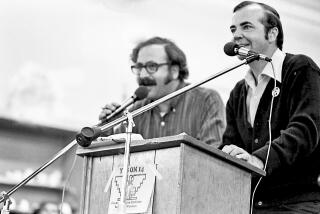Carl McIntire, 95; Firebrand Radio Evangelist
- Share via
The Rev. Carl McIntire, a firebrand fundamentalist radio evangelist who railed against communism, liberalism, racial integration, sex education, evolution and water fluoridation from his broadcast pulpit for four decades, has died. He was 95.
McIntire died of natural causes Tuesday in Voorhees, N.J.
From 1938 to 1998, he served as pastor of Collingswood Bible Presbyterian Church in Collingswood, N.J.; and from 1948 until his death, he was president of the International Council of Christian Churches, a group of fundamentalist denominations.
During the peak of his popularity in the 1960s, McIntire’s daily half-hour “20th Century Reformation Hour” radio program was carried on more than 600 stations in the United States and Canada.
McIntire’s belief that every word of the Bible was inspired by God and his ultraconservative political views earned him a loyal radio following.
But McIntire, who called himself “the servant of the Lord in a very holy cause,” had a flair for making his views heard off the air as well.
Vocal Opponent of ‘Pingpong Diplomacy’
In 1971, he led 14,000 mostly middle-aged demonstrators down Pennsylvania Avenue in Washington, demanding U.S. victory in Vietnam and promising “we are going to keep this country from falling to the Communists.”
In the wake of so-called “pingpong diplomacy,” in which an American table-tennis team visited China and a Chinese team visited the U.S. in 1971, McIntire played a game of table tennis in front of the White House to protest what he called Nixon’s appeasement of Communist China.
McIntire also picketed meetings of religious groups, including the World Council of Churches, where he protested appearances by religious leaders from behind the Iron Curtain who he said were KGB agents.
A tall man with wavy gray hair who was once described as having “the polished grace of a successful businessman,” McIntire wasn’t bashful about criticizing fellow clergymen.
In 1980, he called evangelist Oral Roberts a “fraud and a fake” after Roberts declared that he had seen a vision of a 900-foot Jesus supporting Roberts’ controversial multimillion-dollar hospital complex in Tulsa, Okla.
“No decent Christian” believes Jesus is 900 feet tall, McIntire said.
In the late 1960s, McIntire faced criticism of his own when his radio broadcasts got him into trouble with the Federal Communications Commission.
At the time, major civic and religious groups were complaining that the station on which McIntire broadcast his program served as an outlet for what one clergyman called “highly racist, anti-Semitic, anti-Negro, anti-Roman Catholic” sentiments.
McIntire broadcast his program live from WXUR in Media, Pa., a station owned by Philadelphia’s Faith Theological Seminary, where McIntire served as president.
Battled FCC Over ‘Fairness Doctrine’
In 1970, the FCC determined that the station had consistently violated the “fairness doctrine,” which requires a station to provide radio time to people who have been attacked on the air.
After McIntire waged a two-year legal battle, the FCC revoked the station’s license. Within two months, more than 200 stations dropped his program.
Marianna Clark, McIntire’s daughter, said Friday that her father “never criticized anyone else’s theological or political opinions without offering them [a chance] to come on his station and reply, but no one would come on to discuss it or debate with him.”
As she sees it, “the liberal groups that were opposing his conservative views ganged up and went to the FCC and said this radio station is not abiding by the fairness doctrine. It was a devastating thing that the FCC did in taking away this man’s religious freedom and his freedom of speech.”
In 1973, McIntire attempted to broadcast from a pirate radio station on a former Navy mine sweeper off the New Jersey coast, but the Coast Guard put a quick stop to it.
The loss of McIntire’s radio audience took a heavy toll.
Contributions from his radio audience--reportedly an estimated $3.9 million a year in small contributions in 1971--dried up, and McIntire was no longer able to support his ministries. The Christian Beacon Press, for which McIntire served as editor, went bankrupt, and its various holdings were lost. They included the property that housed Shelton College, a Christian liberal arts institution in Cape May, N.J.; and hotels in Cape May and Cape Canaveral, Fla., which served as Bible conference centers and vacation lodging for McIntire’s followers.
In a separate bankruptcy, the land in Philadelphia that housed Faith Theological Seminary also was lost, McIntire’s daughter said.
The son of a Presbyterian minister, McIntire was born in Ypsilanti, Mich., in 1906. When he was 7, he moved to Oklahoma, where his mother’s parents had been missionaries to the Choctaw Indians.
McIntire earned his undergraduate degree at Park College in Parkville, Mo., studied at Princeton Theological Seminary and earned his divinity degree at Westminster Seminary in 1931.
McIntire was ordained in the Presbyterian Church. But after he criticized the church’s missionaries as liberal, an ecclesiastical court in 1935 found him guilty of “sowing dissension within the church,” and his ministerial credentials were withdrawn.
In 1938, McIntire helped form the Bible Presbyterian denomination in Collingswood.
He stopped preaching at his church in 1998. But he continued to broadcast his “Reformation Hour,” which by the early 1990s aired on only two stations. It continues to air once a week in Camden, N.J., and five days a week in Baltimore.
McIntire made his last live broadcast a few months ago, and programs featuring taped sermons he made at his church are still airing. Clark expects the broadcasts to continue and, she said, her father’s sermons are on the Internet.
In addition to Clark, McIntire is survived by his second wife, Alice; daughter, Celeste Bashaw of Pennington, N.J.; son, Thomas, of Toronto; 13 grandchildren; and 10 great-grandchildren.
More to Read
Sign up for Essential California
The most important California stories and recommendations in your inbox every morning.
You may occasionally receive promotional content from the Los Angeles Times.










